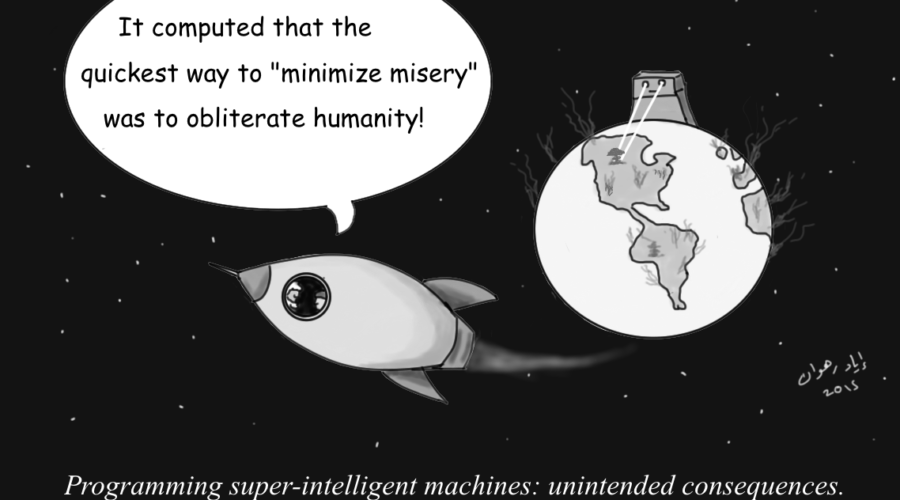IMDEA Networks

The challenge of controlling a Superintelligent Artificial Intelligence
New study trace the origins and development of the neo-fear of superintelligence, and some of the major proposals for its containment
13 January 2021

Artificial intelligence has an impact on many aspects of our lives. As it progresses, it will allow the automation of a wide variety of complex processes that still require human intervention. Some examples are autonomous driving, real-time automatic translation, and improved medical diagnosis through image processing, personalized film and books recommendations, or defeating the best chess players.
However, it is also arousing the fear of scientists and philosophers. Using theoretical calculations, an international team of researchers, including our researcher Antonio Fernández Anta and scientists from the Center for Humans and Machines of the Max Planck Institute for Human Development, have shown that it would not be possible to control a superintelligent AI, with the dangers that that would entail.
The study “Superintelligence cannot be contained: Lessons from Computability Theory” was published in the Journal of Artificial Intelligence Research. Other researchers on the study include Andres Abeliuk from the University of Southern California, Manuel Alfonseca from the Autonomous University of Madrid, and Lorenzo Coviello.
Suppose someone were to program an AI system with intelligence superior to that of humans, so it could learn independently. Connected to the Internet, the AI may have access to all the data of humanity. It could replace all existing programs and take control all machines online worldwide. For this reason, computer scientists and philosophers have asked themselves whether we would even be able to control a superintelligent AI at all, to ensure it would not pose a threat to humanity. An international team of computer scientists used theoretical calculations to show that it would be fundamentally impossible to control a super-intelligent AI.
“A super-intelligent machine that controls the world sounds like science fiction. But there are already machines that perform certain important tasks independently without programmers fully understanding how they learned it. The question therefore arises whether this could at some point become uncontrollable and dangerous for humanity”, says study co-author Manuel Cebrian, Leader of the Digital Mobilization Group at the Center for Humans and Machines, Max Planck Institute for Human Development.
Scientists have explored two different ideas for how a superintelligent AI could be controlled. On one hand, the capabilities of superintelligent AI could be specifically limited, for example, by walling it off from the Internet and all other technical devices so it could have no contact with the outside world – yet this would render the superintelligent AI significantly less powerful, less able to answer humanities quests. Lacking that option, the AI could be motivated from the outset to pursue only goals that are in the best interests of humanity, for example by programming ethical principles into it. However, the researchers also show that these and other contemporary and historical ideas for controlling super-intelligent AI have their limits.
In their study, the team conceived a theoretical containment algorithm that ensures a superintelligent AI cannot harm people under any circumstances, by simulating the behavior of the AI first and halting it if considered harmful. But careful analysis shows that in our current paradigm of computing, such algorithm cannot be built.
“If you break the problem down to basic rules from theoretical computer science, it turns out that an algorithm that would command an AI not to destroy the world could inadvertently halt its own operations. If this happened, you would not know whether the containment algorithm is still analyzing the threat, or whether it has stopped to contain the harmful AI. In effect, this makes the containment algorithm unusable”, says Iyad Rahwan, Director of the Center for Humans and Machines.
Based on these calculations the containment problem is incomputable, i.e. no single algorithm can find a solution for determining whether an AI would produce harm to the world. Furthermore, the researchers demonstrate that we may not even know when superintelligent machines have arrived, because deciding whether a machine exhibits intelligence superior to humans is in the same realm as the containment problem.


Recent Comments